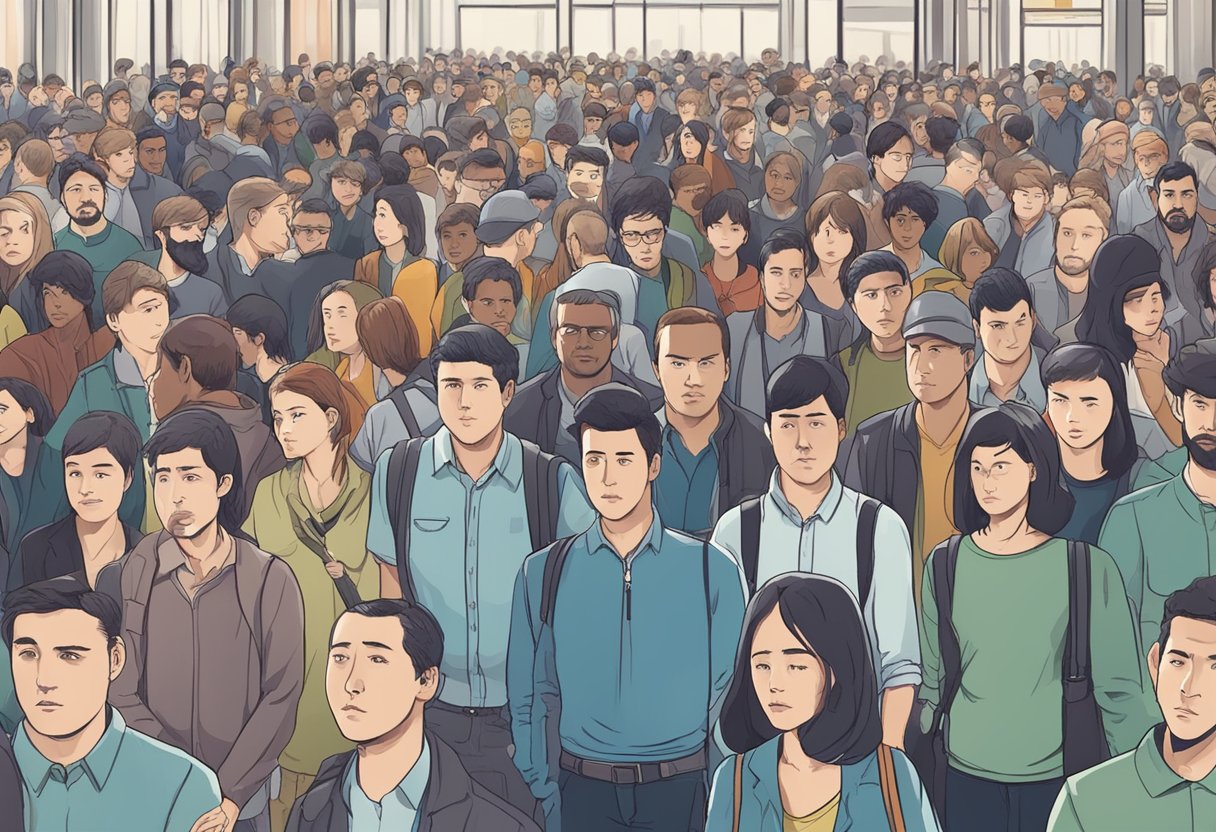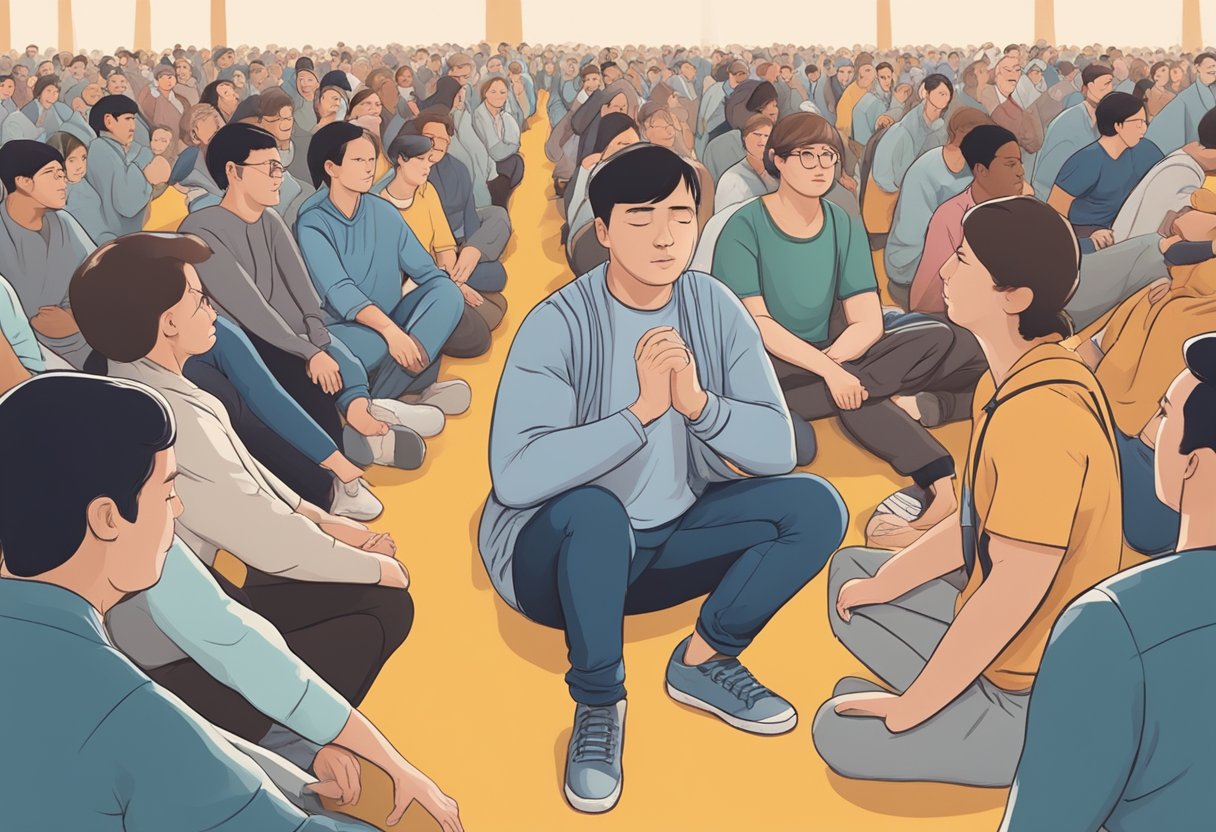In this informative article, learn about the causes of anxiety around strangers and effective coping strategies.
Table of Contents
Introduction – Anxiety around Strangers
Anxiety around strangers is a common experience that many people face at some point in their lives. It can be a normal response to unfamiliar situations and people, but for some individuals, it can become overwhelming and lead to social anxiety disorder. This type of anxiety disorder can impact mental health and wellness, relationships, and everyday life activities.

Understanding Anxiety Around Strangers
Anxiety around strangers can manifest in different ways, such as feeling nervous, uneasy, or uncomfortable in social situations. It can also lead to physical symptoms such as sweating, shaking, or an increased heart rate. These responses are natural and can result from the body’s fight or flight response to perceived threats.
Age-Related Anxiety Responses
Age can also play a role in anxiety around strangers. For example, children may feel anxious around unfamiliar people or in new environments. Similarly, older adults may experience social anxiety due to feelings of isolation or changes in their social support systems. It is essential to recognize that anxiety around strangers can affect individuals of all ages and backgrounds.
Key Takeaways
- Anxiety around strangers is a common experience that can lead to social anxiety disorder.
- Anxiety responses can be natural and a result of the body’s fight or flight response to perceived threats.
- Age can play a role in anxiety around strangers, and it can affect individuals of all ages and backgrounds.
Understanding Anxiety Around Strangers

Defining Social Anxiety Disorder
Social anxiety disorder, also known as social phobia, is a type of anxiety disorder characterized by intense fear, nervousness, and self-consciousness in social situations. People with social anxiety disorder often fear being judged, criticized, or rejected by others and may avoid social situations altogether. According to the National Institute of Mental Health (NIMH), social anxiety disorder affects approximately 6.8% of the U.S. population each year.
Symptoms and Diagnostic Criteria
The diagnostic criteria for social anxiety disorder, as outlined in the Diagnostic and Statistical Manual of Mental Disorders, Fifth Edition (DSM-5), include persistent and excessive fear or anxiety in one or more social situations, fear of being negatively evaluated or scrutinized by others, and avoidance of or distress in social situations. Physical symptoms of social anxiety disorder can include sweating, trembling, rapid heartbeat, and shortness of breath.
Causes and Risk Factors
The exact causes of social anxiety disorder are not fully understood, but research suggests that a combination of genetic, environmental, and psychological factors may contribute to its development. Some risk factors for social anxiety disorder include a family history of anxiety disorders, a history of childhood abuse or neglect, and certain personality traits, such as shyness or introversion.
| Source | Key Findings | Keywords/Entities |
|---|---|---|
| NIMH | Social anxiety disorder affects approximately 6.8% of the U.S. population each year. | social anxiety disorder, NIMH, U.S. population |
| DSM-5 | The diagnostic criteria for social anxiety disorder include persistent and excessive fear or anxiety in one or more social situations, fear of being negatively evaluated or scrutinized by others, and avoidance of or distress in social situations. | DSM-5, social anxiety disorder, diagnostic criteria |
| Mayo Clinic | Risk factors for social anxiety disorder include a family history of anxiety disorders, a history of childhood abuse or neglect, and certain personality traits, such as shyness or introversion. | Mayo Clinic, social anxiety disorder, risk factors |
In conclusion, social anxiety disorder is a type of anxiety disorder characterized by intense fear, nervousness, and self-consciousness in social situations. It can cause significant impairment in daily life and can be effectively treated with therapy and/or medication.
Age-Related Anxiety Responses

Anxiety around strangers can affect individuals of all ages. However, how anxiety manifests can vary depending on the age of the individual. In this section, we will explore how anxiety responses differ across different age groups.
Stranger Anxiety in Babies and Young Children
Babies and young children often experience stranger anxiety, which is a normal developmental response to unfamiliar people. According to a study published in the National Library of Medicine, stranger anxiety typically begins around 8 to 9 months and peaks between 12 and 15 months. During this time, babies may become fearful or distressed when encountering unfamiliar people, especially when separated from their caregivers.
Caregivers are essential in helping babies and young children manage their anxiety around strangers. By providing a secure and predictable environment, caregivers can help children feel safe and develop a sense of trust. Caregivers can also use techniques such as gradual exposure to unfamiliar people and positive reinforcement to help children overcome their anxiety.
Anxiety in School-Age Children and Adolescents
As children grow older, their anxiety responses may change. School-age children and adolescents may experience anxiety around strangers in social situations such as school or extracurricular activities. They may feel self-conscious or worry about being judged by others.
According to a study published on About Social Anxiety, the best way to manage anxiety around strangers is through techniques such as deep breathing, positive self-talk, and exposure therapy. Caregivers and educators can also play a crucial role in helping children manage their anxiety by providing a supportive and non-judgmental environment.
Here are some key findings related to anxiety around strangers in different age groups:
| Age Group | Key Findings | Keywords/Entities |
|---|---|---|
| Babies and young children | Stranger anxiety is a normal developmental response to unfamiliar people. | Stranger anxiety, babies, young children, separation anxiety, caregivers |
| School-age children and adolescents | Anxiety around strangers may manifest in social situations. | Anxiety, school, adolescents, caregivers |
| All age groups | Techniques such as deep breathing, positive self-talk, and exposure therapy can help manage anxiety around strangers. | Anxiety, deep breathing, positive self-talk, exposure therapy |
Sources:
Impact on Daily Life and Relationships

Anxiety around strangers can have a significant impact on an individual’s daily life and relationships. It can lead to challenges in work and academics, as well as interpersonal relationships and social isolation.
Work and Academic Challenges
Anxiety can make it difficult for individuals to perform well in their work or academic environments. According to a study published in the Journal of Anxiety Disorders, individuals with social phobia tend to have lower levels of confidence in their social skills, which can lead to increased stress and poorer performance in social situations. This can be particularly challenging in work environments that require frequent social interactions or presentations.
Interpersonal Relationships and Social Isolation
Anxiety around strangers can also have a negative impact on interpersonal relationships. Individuals with social anxiety may avoid social gatherings or experience difficulty initiating conversations, which can lead to feelings of isolation and loneliness. According to a study published in the Journal of Personality and Social Psychology, social anxiety is associated with a greater likelihood of experiencing family conflict and lower levels of social support from family members.
| Source | Key Findings | Related Keywords/Entities |
|---|---|---|
| Journal of Anxiety Disorders | Individuals with social phobia tend to have lower levels of confidence in their social skills, which can lead to increased stress and poorer performance in social situations. | social phobia, confidence, stress, performance, social situations |
| Journal of Personality and Social Psychology | Social anxiety is associated with a greater likelihood of experiencing family conflict and lower levels of social support from family members. | social anxiety, family conflict, social support, family members |
It is important for individuals experiencing anxiety around strangers to seek support and treatment. Cognitive-behavioral therapy (CBT) and medication can be effective treatments for social anxiety. By addressing their anxiety, individuals can improve their daily lives and relationships.
Treatment and Management Strategies

Anxiety around strangers can be successfully treated and managed through a combination of professional therapy options, medications, and self-help techniques and coping skills.
Professional Therapy Options
Mental health professionals, such as therapists, can provide behavioral therapy, cognitive-behavioral therapy (CBT), and exposure therapy to help individuals overcome anxiety around strangers. According to a Psychology Today article, CBT is particularly effective in treating social anxiety disorder. The article also notes that exposure therapy can help individuals gradually become more comfortable with social situations.
Medications and Their Role
Medications can also play a role in treating anxiety around strangers. Anti-anxiety medications, such as benzodiazepines, can help reduce symptoms of anxiety, while antidepressants can help regulate the brain chemicals that contribute to anxiety. However, it is important to note that medications should be used in conjunction with therapy and self-help techniques, as they are not a cure on their own.
A Healthline article states that individuals should work closely with their mental health professionals to determine the best medication and dosage for their needs.
Self-Help Techniques and Coping Skills
Self-help techniques and coping skills can also be effective in managing anxiety around strangers. Deep breathing, positive self-talk, and mindfulness techniques can help individuals calm their minds and reduce anxiety in social situations. A Calm Clinic article suggests practicing talking to strangers in safe social situations, such as a friend’s dinner party, to help build confidence and reduce anxiety.
Individuals need to work with a mental health professional to identify the most effective treatment and management strategies for their specific needs. With the right approach, anxiety around strangers can be successfully managed and overcome.
| Source | Key Findings | Keywords/Entities |
|---|---|---|
| Psychology Today | CBT is particularly effective in treating social anxiety disorder | Mental health, therapist, cognitive-behavioral therapy, social anxiety disorder |
| Healthline | Individuals should work closely with their mental health professionals to determine the best medication and dosage for their specific needs. | Medication, mental health professional, anti-anxiety medications, antidepressants |
| Calm Clinic | Practicing talking to strangers in safe social situations can help build confidence and reduce anxiety. | Self-help techniques, coping skills, social situations |
Overcoming Social Anxiety Symptoms

Individuals with social anxiety disorder may experience a range of symptoms, including nervousness, sweating, blushing, tension, and difficulty making eye contact. They may also experience trauma related to intense or negative social experiences, shyness, trembling, nausea, dizziness, increased heart rate, and muscle tension. These symptoms can be debilitating, leading to impaired social functioning and avoidance of social situations.
Building Confidence and Self-Compassion
One way to overcome social anxiety symptoms is to build confidence and self-compassion. This can be done through positive self-talk, focusing on personal strengths, and practicing self-care. Individuals can also seek support from friends, family, or a mental health professional to help them develop coping strategies.
According to a Psychology Today article, self-compassion can help individuals with social anxiety disorder by reducing negative self-talk and increasing feelings of self-worth. Practicing self-compassion involves treating oneself with kindness and understanding rather than criticism and judgment.
Facing Fears Through Exposure
Another way to overcome social anxiety symptoms is through exposure therapy, which involves gradually exposing oneself to feared social situations. This can help individuals desensitize to social anxiety triggers and develop coping skills to manage anxiety symptoms.
According to HelpGuide.org, exposure therapy can be an effective treatment for social anxiety disorder. This therapy involves starting with less intimidating social situations and gradually working up to more challenging ones. Through this process, individuals can learn to face their fears and develop confidence in their ability to manage social anxiety symptoms.
| Source | Key Findings | Related Keywords/Entities |
|---|---|---|
| Psychology Today | Self-compassion can help individuals with social anxiety disorder by reducing negative self-talk and increasing feelings of self-worth. | self-compassion, social anxiety disorder, negative self-talk, self-worth |
| HelpGuide.org | Exposure therapy can be an effective treatment for social anxiety disorder. This therapy involves starting with less intimidating social situations and gradually working up to more challenging ones. | exposure therapy, social anxiety disorder, challenging social situations |
Frequently Asked Questions
What are effective therapies for managing social anxiety disorder?
Effective therapies for managing social anxiety disorder include cognitive-behavioral therapy (CBT), exposure therapy, and medication. CBT helps individuals identify and change negative thought patterns and behaviors that contribute to their anxiety. Exposure therapy involves gradually exposing individuals to anxiety-provoking situations to help them build confidence and reduce their fear. Medications such as selective serotonin reuptake inhibitors (SSRIs) and benzodiazepines may also be used to manage symptoms.
What strategies can help in overcoming social anxiety in social settings?
Several strategies can help individuals overcome social anxiety in social settings. These include practicing deep breathing and relaxation techniques, setting small goals for social interactions, and gradually exposing oneself to anxiety-provoking situations. Desensitization can also be helpful, which involves visualizing oneself in social situations and gradually increasing exposure to them.
What are common symptoms experienced by individuals with social anxiety?
Common symptoms experienced by individuals with social anxiety include fear of judgment or embarrassment, avoidance of social situations, physical symptoms such as sweating or shaking, and negative self-talk. These symptoms can significantly impact an individual’s daily life and relationships.
What differentiates the various types of social anxiety disorders?
Different types of social anxiety disorders are differentiated by the specific situations that trigger anxiety. For example, generalized social anxiety disorder involves anxiety in a variety of social situations, while specific social anxiety disorder involves anxiety in specific situations such as public speaking or using public restrooms.
Which medications are considered most effective for treating social anxiety?
Selective serotonin reuptake inhibitors (SSRIs) and benzodiazepines are considered the most effective medications for treating social anxiety. SSRIs are a type of antidepressant that can help manage symptoms over time, while benzodiazepines are a type of anti-anxiety medication that can provide more immediate relief.
How can one identify and address the root causes of social anxiety?
Identifying and addressing the root causes of social anxiety involves working with a therapist to explore past experiences and thought patterns that may be contributing to anxiety. This may involve identifying and challenging negative beliefs about oneself or others, as well as developing coping strategies and building self-esteem.




